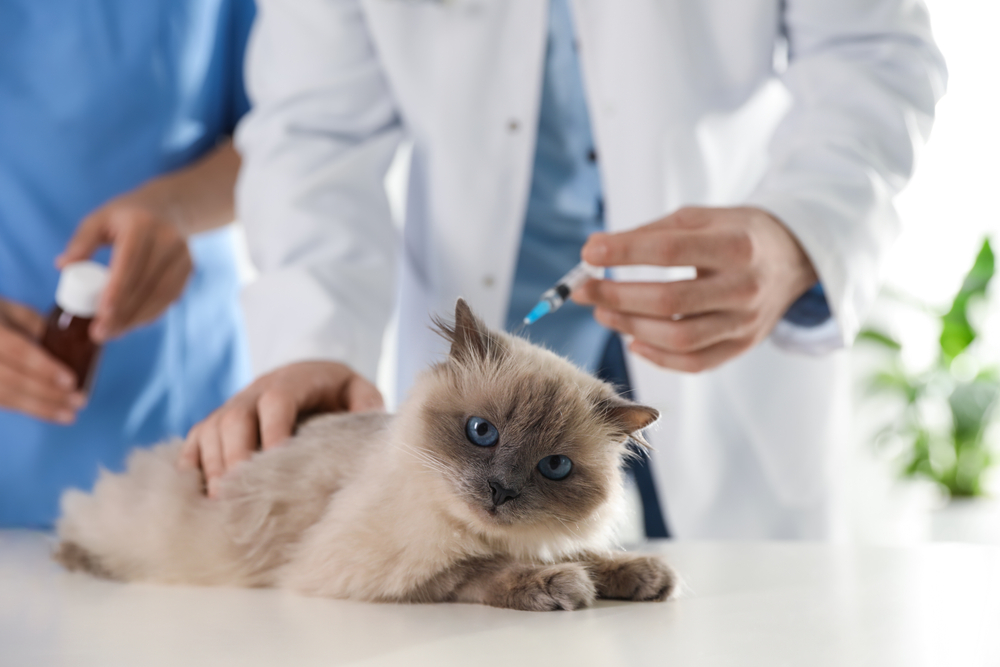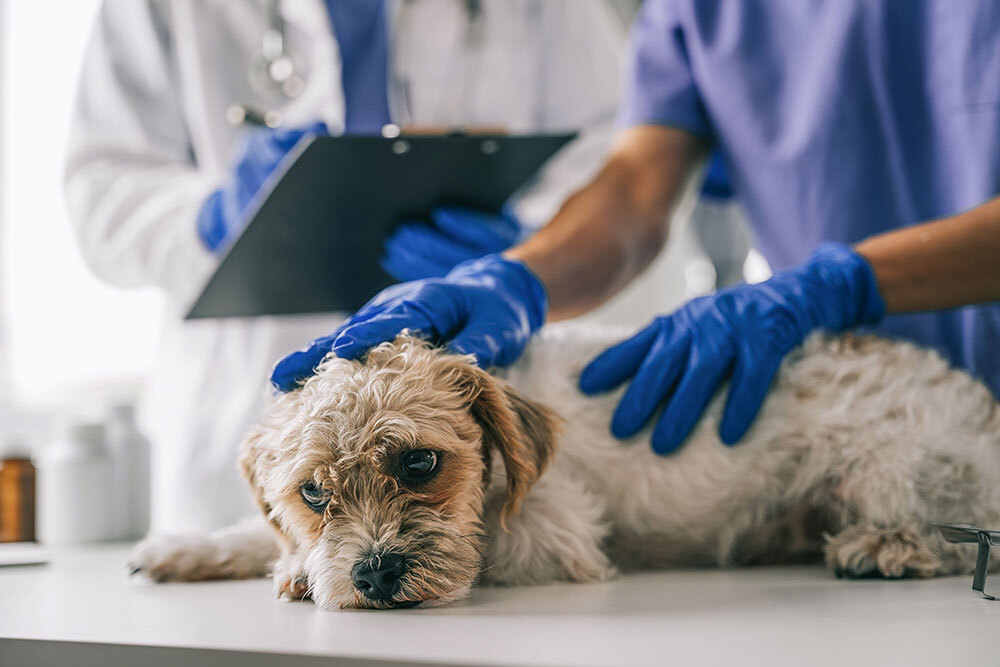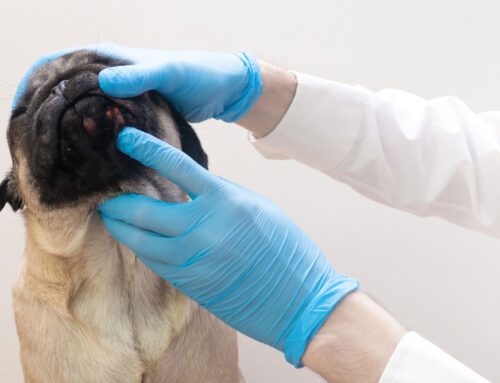At Palisades Veterinary Hospital in Fountain Hills, Arizona, we focus on prevention as the foundation of lifelong pet health. Vaccines, parasite protection, nutrition, and regular exams all work together to reduce your pet’s risk of illness and catch small issues before they turn into larger problems.
In this guide, we’ll walk through the key areas of preventive care—from vaccinations to weight management—and explain how each one contributes to keeping your pet healthy, active, and out of the emergency room.
What Are Preventable Pet Diseases?
Preventable diseases are those that can often be avoided through consistent veterinary care, smart lifestyle choices, and early intervention. These include:
- Infectious diseases like rabies, distemper, and leptospirosis
- Parasitic infections such as heartworm, fleas, and intestinal worms
- Chronic conditions like dental disease, arthritis, diabetes, and obesity-related complications
These health issues can affect pets of all ages—even those that live exclusively indoors. Prevention plans are tailored to each pet based on age, breed, lifestyle, and medical history.
Vaccines: Protection That Starts Early and Lasts a Lifetime
Vaccinations prepare your pet’s immune system to defend against dangerous pathogens. They’re a core part of preventive care and are critical for both individual health and public safety.
Core Vaccines for Dogs and Cats
These are recommended for every pet, regardless of environment:
- Rabies
- DHPP (Distemper, Hepatitis, Parvovirus, Parainfluenza) for dogs
- FVRCP (Feline Viral Rhinotracheitis, Calicivirus, Panleukopenia) for cats
Non-Core Vaccines Based on Lifestyle
- Leptospirosis (for pets exposed to standing water or wildlife)
- Bordetella (often required for daycare, boarding, or grooming)
- Feline Leukemia Virus (FeLV) for cats who spend time outdoors
For more detailed recommendations, explore the AVMA’s vaccination guidelines or ask our team for a personalized schedule.
Vaccine Safety and Scheduling
Most pets tolerate vaccines well. Mild fatigue or slight swelling at the injection site may occur, but serious reactions are rare. If your pet falls behind on their schedule, we’ll help you get them back on track with minimal disruption.
Parasite Prevention: Protection Inside and Out
Fleas, ticks, and worms can cause discomfort, spread disease, and—if untreated—lead to serious complications.
External Parasites
- Fleas can trigger allergic reactions and spread tapeworms
- Ticks can transmit Lyme disease and ehrlichiosis
See CDC guidelines for additional information
Internal Parasites
- Heartworm is transmitted by mosquitoes and is fatal if untreated
- Roundworms, hookworms, and giardia are common and often go unnoticed without regular fecal testing
Learn more about year-round parasite prevention and how we tailor prevention strategies based on your pet’s risk level.
Dental Disease: One of the Most Common Preventable Conditions
By age three, most pets show signs of dental disease. Left untreated, this can lead to pain, tooth loss, and systemic issues affecting the kidneys, liver, or heart.
Preventive steps include:
- Regular at-home brushing
- Dental chews or rinses
- Annual cleanings as recommended by your veterinarian
We check your pet’s teeth and gums during every wellness exam and can guide you on building an at-home dental routine.
Obesity and Arthritis: Managing Mobility and Metabolism
Extra weight puts strain on joints, organs, and energy levels—and is a major contributor to arthritis and diabetes.
How to Prevent Weight-Related Health Issues
- Feed an age-appropriate, balanced diet
- Stick to measured portions (we can help calculate them)
- Avoid table scraps and calorie-dense treats
- Encourage daily activity, even for indoor cats
Visit Pet Obesity Prevention for helpful tools
Maintaining a healthy weight helps reduce the risk of arthritis and improves overall mobility, especially in aging pets.
Diabetes: Caught Early, Easily Managed
Diabetes is a rising concern in overweight pets but can often be managed effectively when caught early. During routine bloodwork, we screen for blood sugar and organ function. Early symptoms include increased thirst, weight loss despite eating, or changes in energy levels.
The Role of Annual Wellness Exams
A comprehensive exam is the foundation of preventive care. These visits include:
- Physical exam and weight tracking
- Bloodwork to screen for diabetes, thyroid imbalance, or organ disease
- Dental evaluation
- Parasite screening
- Nutrition and lifestyle review
Learn why these exams matter and how they help detect issues before symptoms appear.
At-Home Monitoring: Small Signs Matter
Watch for subtle behavior or health changes between visits:
- Appetite or weight fluctuations
- Lethargy or stiffness
- Lumps, bumps, or skin issues
- Vomiting, diarrhea, or litter box changes
- Bad breath or difficulty chewing
Your observations help us provide faster, more accurate diagnoses.
Before Your Next Visit: What to Bring
To help us deliver the most personalized care, please bring:
- Your pet’s medication and supplement list
- A fecal sample for parasite testing
- Any photos or notes on behavioral or health changes
- A list of questions or concerns you’d like to discuss
Meet our experienced care team, and let us know if you’d like help preparing for your visit.

Frequently Asked Questions
Does my indoor pet still need vaccines and parasite prevention?
Yes. Several viruses and parasites can enter the home on clothing, shoes, or other pets.
How often should my pet have bloodwork or dental cleanings?
Generally, we recommend annual screening and cleanings, but frequency may increase with age or health status.
Is preventive care worth the cost?
Absolutely. Preventing illness—or catching it early—is almost always more cost-effective than emergency treatment or managing late-stage disease.
Let’s Build a Preventive Plan That Works for You
At Palisades Veterinary Hospital, we believe preventive care should be practical, personalized, and easy to follow. Whether you need guidance on vaccines, nutrition, dental care, or parasite protection, our team is here to support you with clear recommendations and ongoing care.
Schedule your pet’s next appointment today, and we’ll help you take the right steps today to protect their health tomorrow.








Leave A Comment